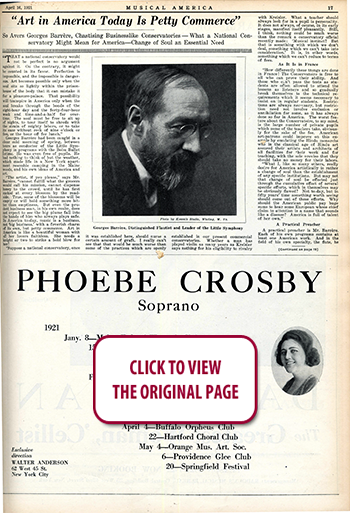 100 YEARS AGO IN MUSICAL AMERICA (389)
100 YEARS AGO IN MUSICAL AMERICA (389)
April 16, 1921
Page 17
“Art in America Today Is Petty Commerce”
So Avers Georges Barrère, Chastising Businesslike Conservatories—What a National Conservatory Might Mean for America—Change of Soul an Essential Need
"THAT a national conservatory would not be perfect is no argument against it. On the contrary, it might be counted in its favor. Perfection is impossible, and the impossible is dangerous. Art becomes possible only when the soul sits so lightly within the prison-house of the body that it can mistake it for a pleasure-palace. That possibility will transpire in America only when the soul breaks through the bonds of the eight-hour day and the forty-four-hour week and time-and-a-half for overtime. The soul must be free to sit up of nights, to tear itself to shreds with the strain of mighty labors, or to take its ease without reck of nine o’clock or five, or the hour off for lunch.”
Georges Barrère had been caught in a clear cold morning of spring, between tours as conductor of the Little Symphony in programs with the Bolm Ballet Intime. He was even free of pupils. He had nothing to think of but the weather, which made life in a New York apartment resemble camping in the Maine woods, and his own ideas of America and art.
“The artist, if you please,” says Mr. Barrère, “cannot fulfill what the grocers would call his mission, cannot dispense honey to the crowd, until he has first sucked at every blossom by the roadside. True, some of the blossoms will be empty or will hold something more bitter than emptiness. But even the prudent business man, in his own realm, does not expect to see the big plums fall into the hands of him who always plays safe. In America to-day, music is a business, not ‘big business,’ with a feverish charm of its own, but petty commerce. Art in America is like a beautiful woman with all her lovers faithless. She needs a knight or two to strike a bold blow for her!
“Suppose a national conservatory, once it was established here, should nurse a certain amount of graft. I really can’t see that that would be much worse than some of the practices which are openly established in our present commercial conservatories. Whether a man has played violin as many years as Kreisler says nothing for his eligibility to rivalry with Kreisler. What a teacher should always look for in a pupil is personality. It does not always, of course, in its early stages, manifest itself pleasantly. Still, I think, nothing could be much worse than the remark a conservatory official recently made: ‘Musical instinct? But that is something with which we don’t deal, something which we can’t take into consideration.’ It is, in other words, something which we can’t reduce to terms of fees.
As It Is in France
“How differently these things are done in France! The Conservatoire is free to all who can prove their ability. And those who can’t pass the tests as students are often allowed to attend the lessons as listeners and so gradually break themselves to the technical requirements which it seems necessary to insist on ·in regular students. Restrictions are always necessary, ·but restriction need not involve exclusion or annihilation for some, as it has always done so far in America. The worst feature about the Conservatoire, to my mind, is the large number of private pupils which some of the teachers take, obviously for the sake of the fee. American art-patrons could improve on this example by emulating the Hindu monarchs who in the classical age of Hindu art assured their artists and architects of all facilities for their work and for teaching, with the sole proviso that they should take no money for their labors.
“What I, like so many others, really desire for America artistically is rather a change of soul than the establishment of any specific institutions. But may not that change of soul be effected just through the cumulative effect of several specific efforts, which in themselves may be obviously flawed? Not to-day, but in fifty years’ time something worth seeing should come out of these efforts. Why should the American public pay huge sums to hear some European whose chief claim to attention is a name that sounds like a disease? America is full of talent of her own.”
A Practical Preacher
A practical preacher is Mr. Barrere. Each of his own programs contains at least one American work. And in the field of his own specialty, the flute, he finds that Americans have already made good contribution. As president of the recently formed New York Flute Club, he hopes for the education of amateurs of the instrument to higher standards and particularly for the publication of good flute music. For this a change in the constitution would be necessary, but not difficult to effect. There are four or five flute clubs in the country with an average membership of 100, and a subscription for only 150 copies is sufficient to pay for the publication of a score. Robert Russell Bennett, a Kansas City composer, has written a Rondo Capriccioso for four flutes with Mr. Barrère particularly admires. He must also admire the Theme and Variations for Flute and String Quartet by Mrs. H.H.A. Beach, for it was included on the program of the last concert of the New York Flute Club, given at the Ansonia recently. —D.J.T.




 RENT A PHOTO
RENT A PHOTO





